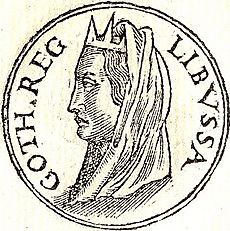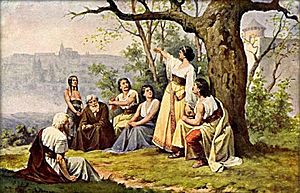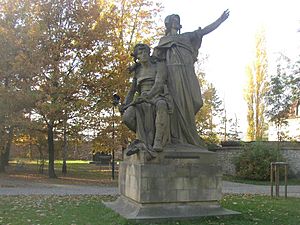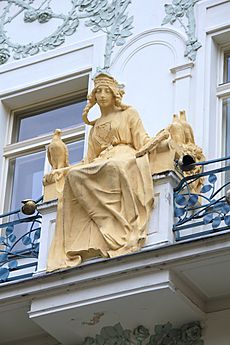Libuše facts for kids
Libuše (also spelled Libussa or Libushe) is a famous legendary figure from Czech history. She is believed to be an ancestor of the Přemyslid dynasty and the entire Czech people. The legend says she was the youngest of three sisters but also the wisest. After her father passed away, she became queen. She married a simple ploughman named Přemysl. Together, they started the important Přemyslid dynasty. Libuše is also famous for predicting and founding the city of Prague in the 8th century.
Contents
The Legend of Libuše


Libuše was said to be the youngest daughter of the mythical Czech ruler, Duke Krok. The stories say she was the smartest of her three sisters. Her sister Kazi was a healer, and Teta was a magician. But Libuše had a special gift: she could see into the future! Because of her wisdom, her father chose her to be his successor and rule over the people.
Many legends say she made her prophecies from her castle at Libušín. Later stories suggest it was from Vyšehrad, a famous fortress in Prague.
Libuše and the Founding of Prague
One famous part of the legend tells how Libuše stood on a rocky cliff high above the Vltava River. She made a powerful prophecy, saying: "I see a great city whose glory will touch the stars." She then ordered her people to build a castle and a town on that very spot. This town was named Prague.
Another version of the legend explains the name "Prague" differently. Libuše told her advisors to find a city where they saw a man making the best use of his teeth at midday. They searched and found a man sawing a block of wood with his saw's "teeth" while everyone else was eating. When asked what he was making, he replied "Prah," which means "threshold" in Czech. So, Libuše named the city Prague (in Czech, "Praha").
Libuše Chooses Přemysl
Even though Libuše was a wise ruler, some men in the tribe were not happy that a woman was in charge. They demanded that she marry. However, Libuše had already fallen in love with a ploughman named Přemysl.
She then shared a vision she had. She described a farmer with one broken sandal, ploughing a field. In other versions, he was eating from an iron table. She told her councilmen to find this man. They were to let a horse loose at a crossroads and follow it. The horse led them to the village of Stadice. There, they found Přemysl exactly as Libuše had described him.
The two important men who found Přemysl brought him to Libuše's palace. Libuše married him, and Přemysl the Ploughman became the new ruler. They had three sons: Radobyl, Lidomir, and Nezamysl. These sons continued the Přemyslid dynasty in the Czech lands.
Libuše in Arts and Culture
The story of Libuše and Přemysl has been told many times throughout history. One of the earliest detailed accounts was written in the 12th century by Cosmas of Prague in his book Chronica Boëmorum.
The mythical figure of Libuše has inspired many plays, operas, and books. Some famous works include:
- Libussa, a play by Franz Grillparzer.
- Libuše, a famous opera by the Czech composer Bedřich Smetana.
- Pole a palisáda, a novel by Miloš Urban.
In 2009, a film about Libuše and Přemysl was released. It was an American-Czech movie called The Pagan Queen.
Even a small planet, 264 Libussa, is named in her honor!
See also
 In Spanish: Libuše para niños
In Spanish: Libuše para niños



